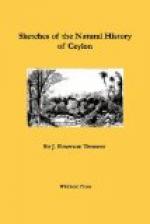As to the latter conjecture; the fall of fish during showers, even were it not so problematical in theory, is too rare an event to account for the punctual appearance of those found in the rice-fields, at stated periods of the year. Both at Galle and Colombo in the south-west monsoon, fish are popularly believed to have fallen from the clouds during violent showers, but those found on the occasions that give rise to this belief, consist of the smallest fry, such as could be caught up by waterspouts, and vortices analogous to them, or otherwise blown on shore from the surf; whereas those which suddenly appear in the replenished tanks and in the hollows which they overflow, are mature and well-grown fish.[1] Besides, the latter are found, under the circumstances I have described, in all parts of the interior, whilst the prodigy of a supposed fall of fish from the sky has been noticed, I apprehend, only in the vicinity of the sea, or of some inland water.
[Footnote 1: I had an opportunity, on one occasion only, of witnessing the phenomenon which gives rise to this popular belief. I was driving in the cinnamon gardens near the fort of Colombo, and saw a violent but partial shower descend at no great distance before me. On coming to the spot I found a multitude of small silvery fish from one and a half to two inches in length, leaping on the gravel of the high road, numbers of which I collected and brought away in my palankin. The spot was about half a mile from the sea, and entirely unconnected with any watercourse or pool.
Mr. Whiting, who was many years resident in Trincomadie, writes me that he “had often been told by the natives on that side of the island that it sometimes rained fishes; and on one occasion” (he adds) “I was taken by them, in 1849, to a field at the village of Karrancotta-tivo, near Batticaloa, which was dry when I passed over it in the morning, but, had been covered in two hours by sudden rain to the depth of three inches, in which there was then a quantity of small fish. The water had no connection with any pond or stream whatsoever.” Mr. Cripps, in like manner, in speaking of Galle, says: “I have seen in the vicinity of the fort, fish taken from rain-water that had accumulated in the hollow parts of land that in the hot season are perfectly dry and parched. The place is accessible to no running stream or tank; and either the fish or the spawn from which they were produced, must of necessity have fallen with the rain.”
Mr. J. PRINSEP, the eminent secretary to the Asiatic Society of Bengal, found a fish in the pulviometer at Calcutta, in 1838.—Journ. Asiat. Soc. Bengal, vol. vi. p. 465.
A series of instances in which fishes have been found on the continent of India under circumstances which lead to the conclusion that they must have fallen from the clouds, have been collected by the late Dr. BUIST of Bombay, and will be found in the appendix to this chapter.]




